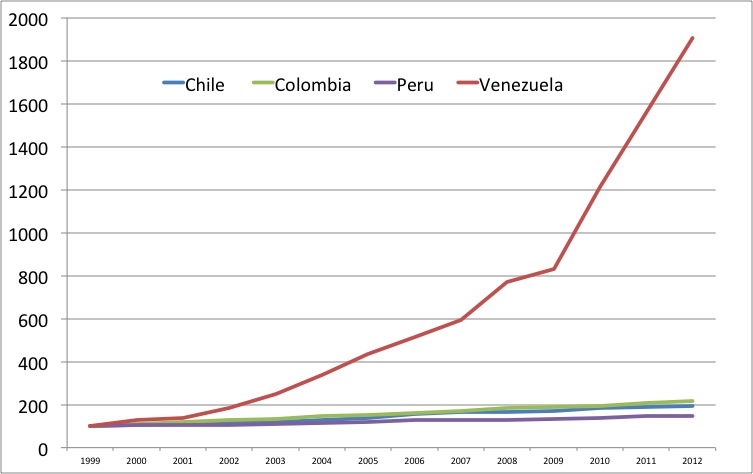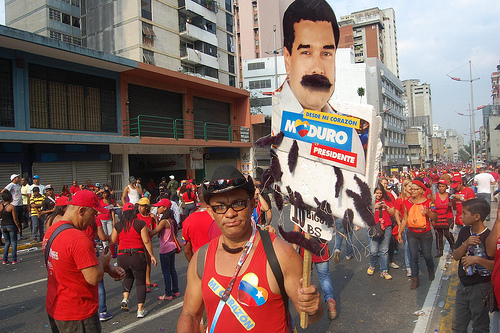Chavismo después Chavez

Shortages of essential goods like milk and toilet paper. Record inflation. High crime rates (at least two celebrities were shot in the recent weeks, former a Miss Venezuela and a former world boxing champion). These are among the reasons why thousands of Venezuelans have taken to the streets to demand the resignation of president Nicolas Maduro. The whole thing started in February as small student protests in some western districts, then grew into the biggest acts of public discontent for the last decade, and eventually reached Caracas, sucking in a number of opposition leaders. The peaceful protests were soon drowned in blood, there were clashes with the security forces, mass arrests of opposition activists, at least a dozen casualties (Maduro himself admits their number could exceed 50), etc.
Meanwhile in other places around Caracas big pro-government rallies are being held, the president appearing before the adoring crowds, casually playing the guitar, and categorically denying to have ever used excessive force for quelling the unrest.
The situation in Venezuela has remained in the shadow of the events in Ukraine, granted. But the vast masses of people involved either in defense or against the president show how divided the country is, and how complicated it would be to achieve a dialogue.
Maduro is strictly following Chavez' precepts. He took power last year, carried on the wings of the public sympathies for the deceased Dear Leader, and thanks to his humble background of a bus driver. Hell, he even used slogans like "Chavez set the course, Maduro is taking the steering wheel". But all of this was only enough for him to win the presidential election by a narrow 1.5% margin (against opposition leader Henrique Caprilles). And the current protests show that he has quickly lost his positive aura which he owed to his personality and to the fact that he had been personally hand-picked by El Comandante himself to be his successor.
After taking power, Maduro has shown that he lacks the charisma of his mentor. Yes, he did win the presidential election, but since then the opposition has managed to articulate its position way more clearly than during the Chavez era. And in the meantime the economic situation has deteriorated severely.

This is the root reason for the constant anti-government protests from the last couple of weeks. The protesters have raised barricades out of burning tires, old furniture and garbage across the streets of Caracas, they're chanting defiant slogans against the state repression and the information blackout. It was a matter of time that the situation would get out of control, and violence would erupt. And it sure did. The opposition is blaming pro-government armed militias riding bikes for the killings, the dreaded Chavist "colectivos". And also the security forces. And Maduro is claiming it was the doing of fascist anti-government groups who were aiming to plunge the country into chaos. The popular protests were then joined by major opposition leader Leopoldo Lopez, who's famous as a hard-liner, and is very popular among the opposition circles, and many are saying he represents their more extreme wing, as opposed to Caprilles who's in favor of peaceful protests and is considered a moderate (he joined the protests much later).
Last month Venezuela canceled the accreditations of several CNN reporters who were reporting on the crisis. "Enough with the militaristic propaganda. I do not accept propaganda against my country. If they do not correct themselves, they should leave Venezuela. Go home, CNN", Maduro said. The government accuses the opposition in trying to stage a pro-American coup, something CIA almost managed to do against Chavez. This led to the expulsion of three US diplomats for "plotting" along with the protesting students. In the meantime, Maduro urged Obama to start negotiations where "the whole truth would be put on the table". Washington responded to his accusations with dismissal and in return kicked out three Venezuelan diplomats. Obama announced that Maduro should focus on "the legitimate discontent of the Venezuelan people". But Maduro rather preferred to continue blaming external factors for the crisis, and attacked Leopoldo Lopez for inciting violence and working in collusion with the CIA. But the eventual arrest of the opposition leader only ignited the protests more.

In fact, there's no lack of legitimate reasons for the discontent. Venezuela is 5th in the world in terms of murder rates, and insecurity is an everyday phenomenon for the vast majority of the people. Inflation has exceeded 56% (2013), which is by far the highest in the region. Energy blackouts are frequent, the black dollar market flourishes, essential goods are absent from the stores. The government blames these shortages on "saboteurs" who want to undermine the system, and on businessmen who are "hungry for profit".
At the end of last year, the parliament conveniently granted Maduro special prerogatives to rule through decree for a one-year term, to pass laws without needing permission from the MPs (and there's no guarantee that he wouldn't extend that term by, well, decree). He sure did promptly use these new powers to introduce a string of economic measures. He imposed a ceiling on the profits, and "more just" prices for the consumers. In November he started an offensive against "unscrupulous businessmen", he ordered his troops to surround stores that were selling electronics at "artificially pumped up prices", and forced them to sell cheaper. And in December he signed a decree that now controls the prices of the newly imported cars and second-use cars. He signed agreements with private corporations like Samsung that would deliver more electronic products for the domestic markets.
Maduro's opponents have qualified these moves as populist and are warning that they'll only deepen the economic distortions, creating more deficits and expanding the black market. Many expect that the government will announce the devaluation of the Venezuelan Bolivar any time soon, although that would certainly be a huge blow on a lot of households. And the rulers are very cautious not to add further reasons for discontent to the already existing ones.

But do these protests poise a threat to Maduro's rule? I'd say, not very likely for the time being. But the direction is already clear. It seems the president still has things under control, mostly. Because he relies on strong support from the poorest segments in the capital and in other cities. But the outcome from this situation depends on the way he would handle the economic problems, because obviously he doesn't have the charisma of his predecessor. So his only chance is to deliver, and fast.
The opposition is starting to rally. It's better organized than before. But it doesn't seem likely that there'll be wide support either witin Venezuela or around it for breaking up the current political framework in the country. Some of Venezuela's regional allies like Argentina, Bolivia and Ecuador have expressed concern about the violence, which they're clearly blaming on the opposition. The Brazilian president Dilma Rousseff has called for dialogue. But for now she doesn't seem willing to assume the role of a possible mediator between the two sides.
At least for the moment, the opposition doesn't seem capable of offering a real alternative to Chavismo. It's still far from being united and powerful. Only Caprilles showed the potential to unite 30 opposition parties around himself, but that coalition failed to perform well at the local elections in December, which the ruling party won by 54%. That was the first major test for the opposition, before possibly being able to rally around a united narrative. But Maduro still retains his strong position, because the economic and social gains for the poorest segments of the Venezuelan society have been fairly tangible, and this does grant him wide support. In the meantime, he's clearly vulnerable, as the protests have shown. And the opposition may see an opportunity in that, and present a real challenge - if it somehow manages to formulate its positions clearly enough, and widen its supporter base.
The difference from Ukraine is that there's a chance that the situation could be resolved by political means. But the countries in the Mercosur region have to guarantee that the problem will be solved politically, not through violence. It's in their best interest, after all.
At least for the time being, Maduro is showing that Chavismo after Chavez is still possible and that it's still the preferable option to what the opposition is offering - from the point of view of the broad public. The protests are mostly drawing their support from the middle class, and while the remaining segments of society have the upper hand in Venezuela, and while they don't recognize and embrace the agenda of the anti-Maduro protesters, change in Venezuela is not very likely. Unless CIA does something adventurous again, and doesn't fail this time.